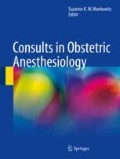Abstract
Antiphospholipid syndrome (APS) is a disorder that is characterized by the presence of antibodies to phospholipid-binding proteins and several other clinical findings. This syndrome results in frequent thromboses and a high level of peripartum morbidity. Women who are pregnant or are considering pregnancy should be carefully evaluated and placed on the appropriate thrombophylaxis for the duration of the pregnancy. The most important consideration for anesthesia providers is the management of thrombophylaxis during the laboring period. Neuraxial anesthesia should be managed carefully with the ASRA (American Society of Regional Anesthesia) anticoagulation guidelines, and patients should be carefully monitored for both bleeding and significant thromboses during the course of labor. Postpartum considerations include the potential development of life-threatening thrombosis and decision about long-term anticoagulation.
Access this chapter
Tax calculation will be finalised at checkout
Purchases are for personal use only
Abbreviations
- APS:
-
Antiphospholipid syndrome
- ASRA:
-
American Society of Regional Anesthesia
- LMWH:
-
Low molecular weight heparin
- SLE:
-
Systemic lupus erythematosus
References
Hurley JH, Tsujishita Y, Pearson MA. Floundering about at cell membranes: a structural view of phospholipid signaling. Curr Opin Struct Biol. 2000;10:737–43.
Tong M, Viall CA, Chamley LW. Antiphospholipid antibodies and the placenta: a systematic review of their in vitro effects and modulation by treatment. Hum Reprod Update. 2015;21(1):97–118.
Miyakis S, Lockshin M, Atsumi T, et al. International consensus statement on an update of the classification criteria for definite antiphospholipid syndrome (APS). J Thromb Haemost. 2006;4:295–306.
Gómez-Puerta JA, Cervera R. Diagnosis and classification of the antiphospholipid syndrome. J Autoimmun. 2014;48–49:20–5.
Lima F, Khamastha MA, Buchanan NM, et al. A study of sixty pregnancies in patients with the antiphospholipid syndrome. Clin Exp Rheumatol. 1996;14:131–6.
Loizou S, Byron MA, Englert HJ, et al. Association of quantitative anticardiolipin antibody levels with fetal loss and time of loss in systemic lupus erythematosus. Q J Med. 1988;68:525–31.
McNeil HP, Chesterman CN, Krilis SA. Immunology and clinical importance of antiphosphlipid antibodies. Adv Immunol. 1991;49:193–280.
Parke AL, Wilson D, Maier D. The prevalence of antiphospholipid antibodies in women with recurrent spontaneous abortion, women with successful pregnancies, and women who have never been pregnant. Arthritis Rheum. 1991;34:1231–5.
Prado AD, Piovesan DM, Staub HL, Horta BL. Association of anticardiolipin antibodies with preeclampsia: a systematic review and meta-analysis. Obstet Gynecol. 2010;116:1433–43.
Ruiz-Irastorza G, Crowther M, Branch W, Khamastha MA. Antiphospholipid syndrome. Lancet. 2010;367:1498–509.
Greer IA, Nelson-Piercy C. Low-molecular-weight heparins for thromboprophylaxis and treatment of venous thromboembolism in pregnancy: a systematic review of safety and efficacy. Blood. 2005;106:401–7.
Noble LS, Kutteh WH, Lashey N, et al. Antiphospholipid antibodies associated with recurrent pregnancy loss: prospective, multicenter, controlled pilot study comparing treatment with low-molecular-weight heparin versus unfractionated heparin. Fertil Steril. 2005;83:684–90.
Kutteh WH, Ermel LD. A clinical trial for the treatment of antiphospholipid-antibody associated recurrent pregnancy loss with lower dose heparin and aspirin. Am J Reprod Immunol. 1996;35:402–7.
Erkan D, Yazici Y, Peterson MG, Sammaritano L, Lockshin MD. A cross-sectional study of clinical thrombotic risk factors and preventive treatments in antiphospholipid syndrome. Rheumatology. 2002;41:924–9.
Horlocker TT, Wedel DJ, Rowlingson JC, et al. Regional anesthesia in the patient receiving antithrombotic or thrombolytic therapy. American Society of Regional Anesthesia and Pain Medicine Evidence-Based Guidelines (Third edition). Reg Anesth Pain Med. 2010;35:64–101.
Cevera R, Bucciarelli S, Plasin MA, Gomez-Puerta JA, Plaza J, Pons-Estel G, et al. Catastrophic antiphospholipid syndrome (CAPS): descriptive analysis of a series of 280 patients from the “CAPS Registry”. J Autoimmun. 2009;32:240–5.
Author information
Authors and Affiliations
Corresponding author
Editor information
Editors and Affiliations
Rights and permissions
Copyright information
© 2018 Springer International Publishing AG, part of Springer Nature
About this chapter
Cite this chapter
Paek, J., Chandrasekhar, S. (2018). Antiphospholipid Syndrome. In: Mankowitz, S. (eds) Consults in Obstetric Anesthesiology. Springer, Cham. https://doi.org/10.1007/978-3-319-59680-8_9
Download citation
DOI: https://doi.org/10.1007/978-3-319-59680-8_9
Published:
Publisher Name: Springer, Cham
Print ISBN: 978-3-319-59679-2
Online ISBN: 978-3-319-59680-8
eBook Packages: MedicineMedicine (R0)

